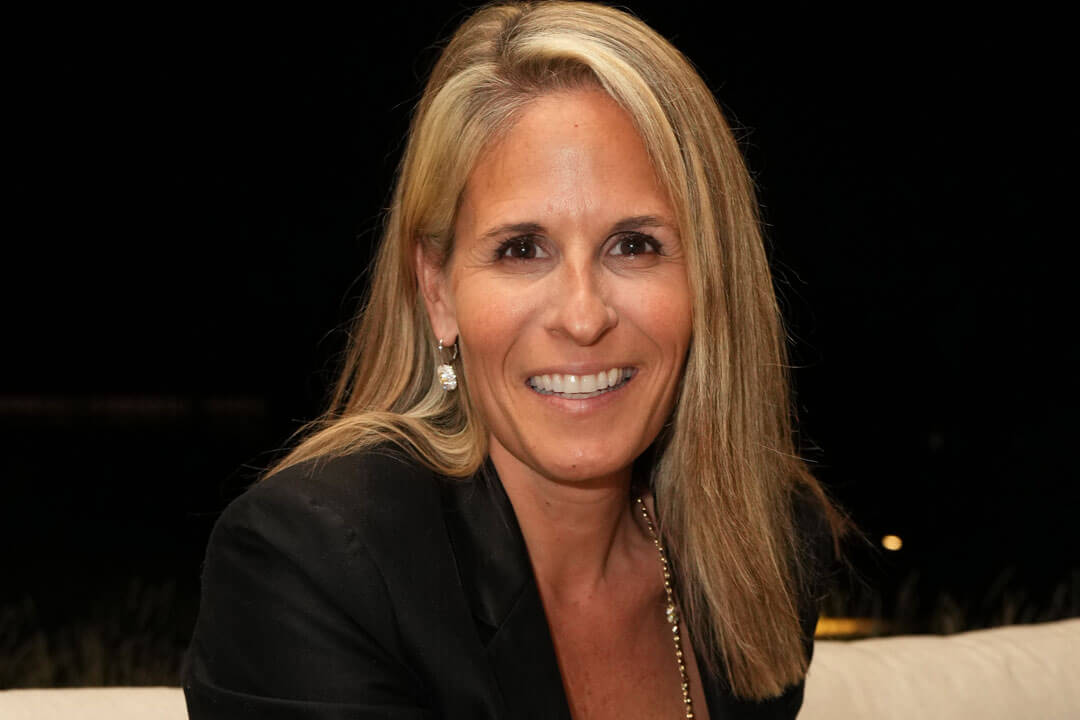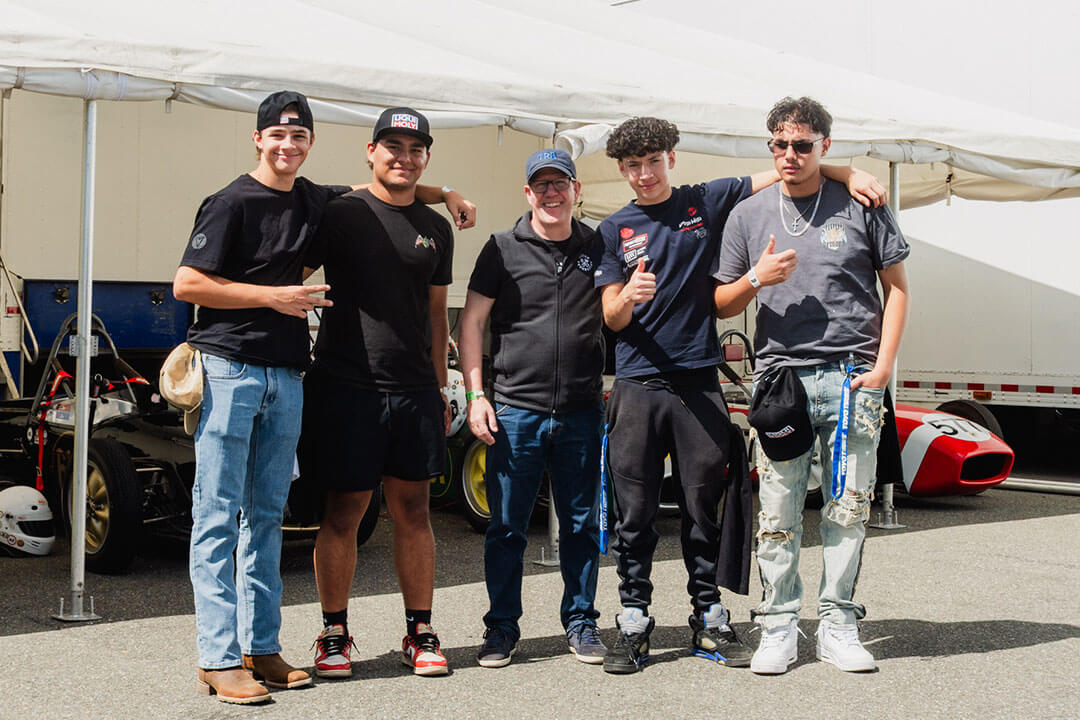Everything You Don’t Know About the Next Generation of Collector Car Technicians: A Discussion Panel
At the Cavallino Classic 2023, The Piston Foundation presented a first-of-its-kind discussion panel about the challenges that keep young car enthusiasts from pursuing careers as collector car technicians.
The discussion, which featured the voices of today’s auto restoration students, was titled, The New Wave: Everything You Don’t Know About the Next Generation of Collector Car Technicians.
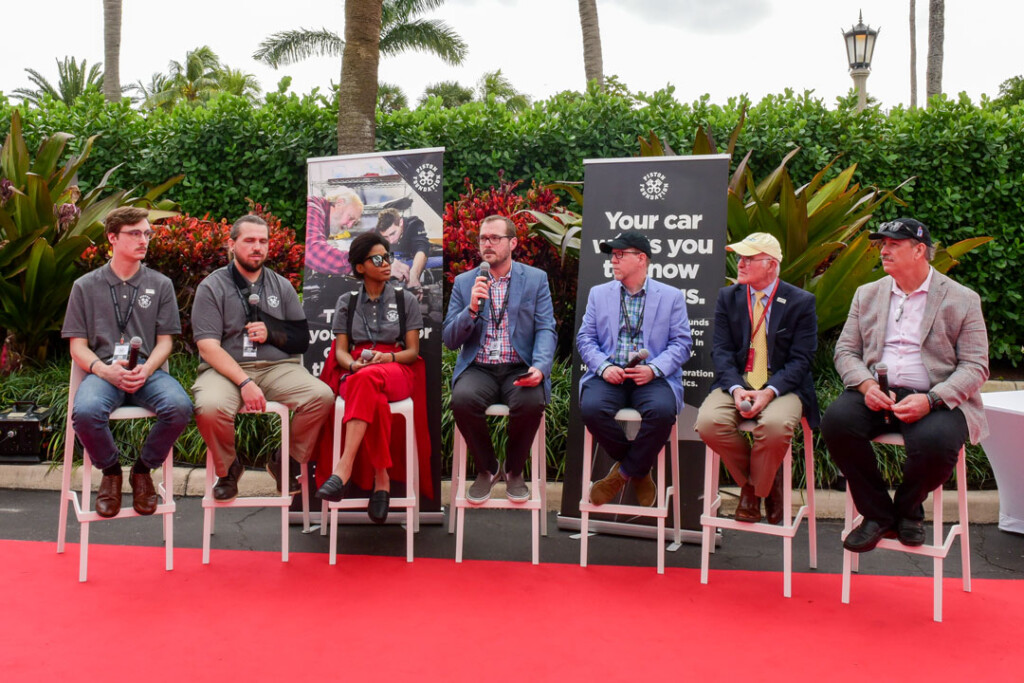
By Christopher Perkowski
February 22, 2023
[addthis tool=”addthis_inline_share_toolbox_a1tk”]
As the people who build the collector car industry retire, it’s essential that a career path into the industry is created to help young car enthusiasts turn their interest into a rewarding career. That’s the mission of the Piston Foundation, an independent 501(c)(3) public charity that helps people acquire the education and hands-on training to build a career as collector car technicians.
The panel was led by the Piston Foundation’s Manager of Development Sperry Hutchinson II, and co-hosted by Jeff Mason, Piston’s President/COO. The panelists included students Jacob Koehn, Sean Whetstone and Zoe Carmichael, who were joined by Paul Russell, owner of Paul Russell and Company in Essex, Massachusetts, along with Jon Dega, who operates Rare Classics Restorations LLC in Boca Raton, Florida. Each of the students on the panel was a member of the inaugural class of Piston Scholars, each of whom received a Piston Foundation trade school scholarship in 2022.
Watch the Presentation
Read the Transcript
Questions and answers have been edited and condensed for clarity.
Sperry Hutchinson II, Manager of Development, Piston Foundation (SH):
Our discussion today is titled The New Wave, Everything You Don’t Know About the Next Generation of Collector Car Technicians. The Piston Foundation is dedicated to helping young people acquire the education and the hands-on training to build a career in the collector car industry.
Our conversation today centers around a topic that we all know either personally or anecdotally, and that is that there is an uncertainty to the future of the collector car culture, most often attributed to the perception that younger people are not interested in the automobile as we know it today. The reality that skilled automotive shops and trades people are becoming increasingly scarce.
But fear not. With the help of the panel that is here joining me today, we are going to dispel some of the commonly held fallacies and hopefully arrive at a way that all of us can help to change that.
I’d like to introduce you to our panelists. Representing the next generation of skilled technicians, our three student panelists are all recipients of 2022 Piston Foundation scholarships: Zoe Carmichael, Sean Whetstone, and Jake Koehn.
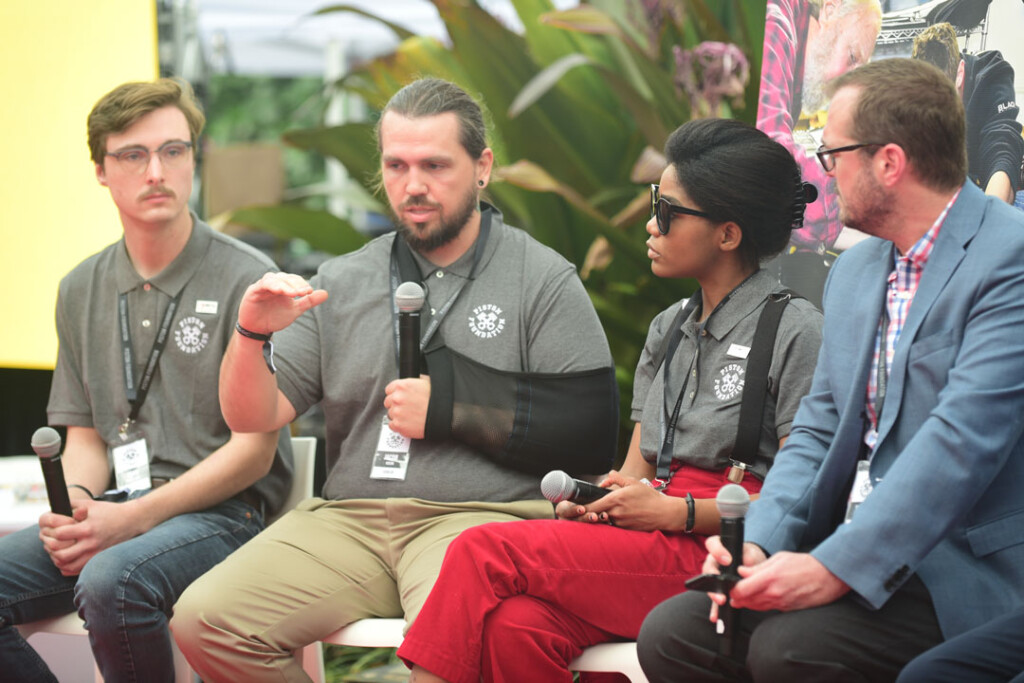
Rounding out our panel to my left are our experts who embody a diverse range of wisdom. I’ll start with first in the middle, the hands-on lead and owner of a renowned service and restoration shop he launched in 1978 when Ferrari’s were rocking eight tracks as well as racetracks and many of today’s classics were wearing their original wiper blades. He’s no stranger to the challenges of education and training as he serves on the board of McPherson College. His business is Paul Russell and Company, and fittingly he is named Mr. Paul Russell.
Our next expert panelist is a familiar face and name to many here today as he makes his home and a tremendous mark on the world of classic cars here in Palm Beach County. His work has rightly earned awards for decades on many of the lawns of the world’s most prestigious concours, as well as being subject to in-numerous lusty eyes on Jay Leno’s garage, as well as in the collection of California’s famed Petersen Automotive Museum. His shop is Rare Classics Restorations and he is Mr. Jon Dega.
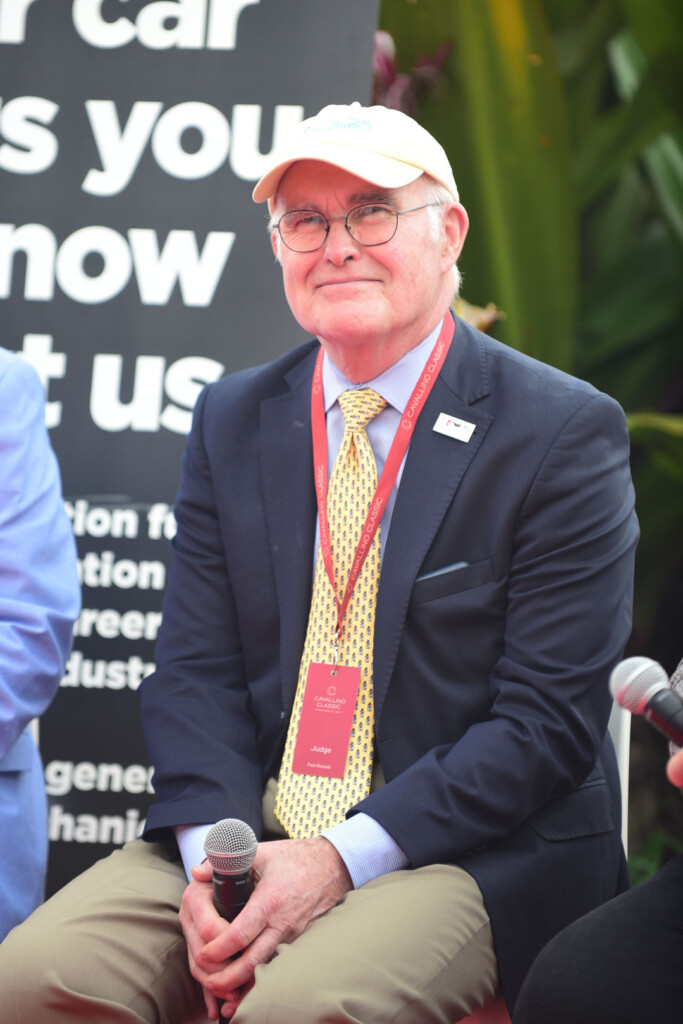
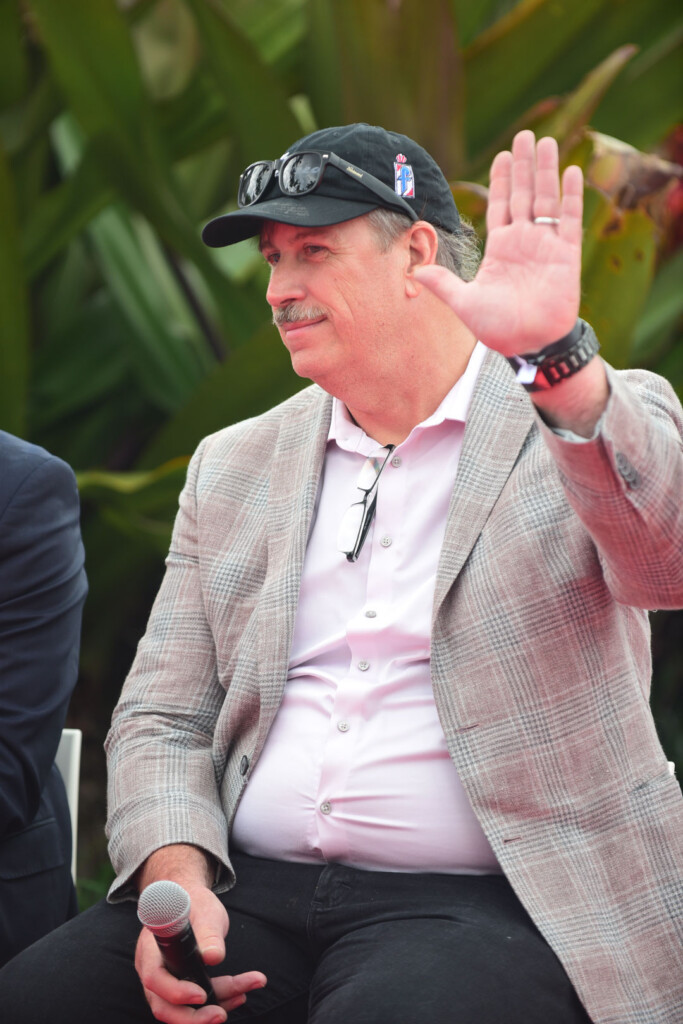
Our final panelist is a man who is an accomplished vintage racer, competing annually in the Carrera Panamericana, he’s a filmmaker, an entrepreneur, and he’s my colleague, the president and COO of the Piston Foundation, Mr. Jeff Mason.
Okay. So Jeff, I’d like to begin by asking you to help us frame this conversation. From your perspective, what is the primary issue keeping young people from being engaged and hopefully keeping our collector car world turning?
Jeff Mason, President & COO, Piston Foundation (JM):
So quite simply, there is no path for a career into the collector car industry for a technician. That is the fundamental issue. Yes, there is education. Yes, you can if you’re lucky enough, find your way into a shop. But for a young person in their teens who has an interest in cars, when they look forward and say, could I make this a career? There is no path that’s evident for them to do that and so we end up losing those interested teens to other industries.
So, for the Piston Foundation, building a career path into the industry is our focus. It starts with awareness, step two is scholarships to support education, then step three apprenticeships, to provide hands-on training. Those are the three things that we’re working to put in place and those are the things that will create a career path that any young person with the interest can follow.
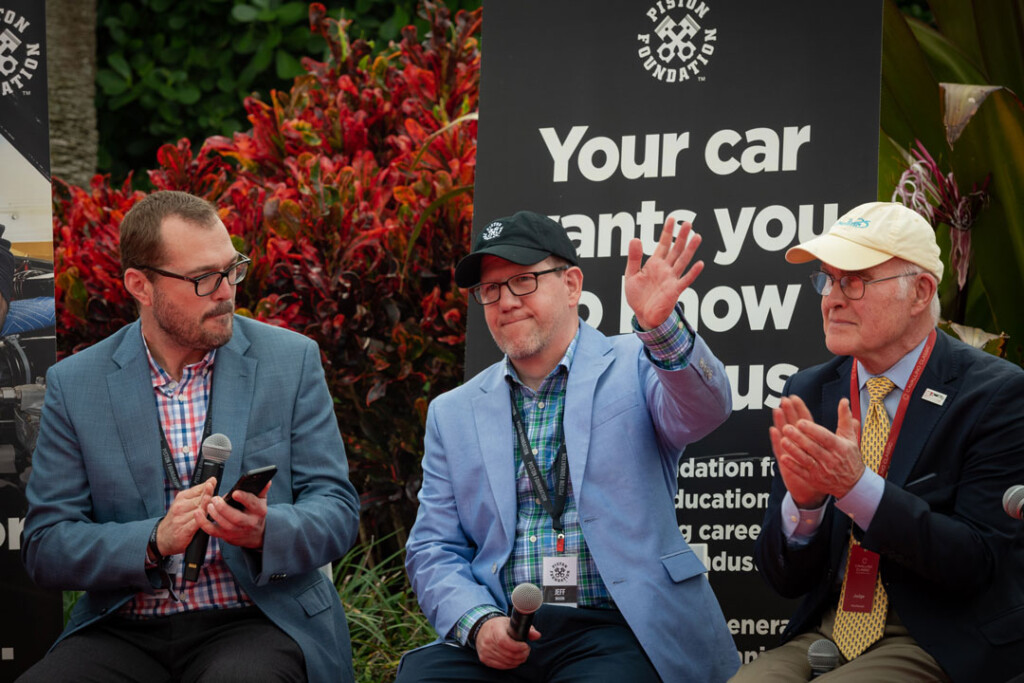
SH:
Awesome. That makes me think about what I said about Jake. You had a career and then you changed course pretty drastically. What was that experience? What led to that decision?
Jacob Koehn, Junior at McPherson College (JK):
The first time I was in college, I felt pressure to find a major. You can only take so many general education classes. I panicked and I picked something that I knew I was good at, which was math. I went with finance, everything made sense, but I reached a point where I was just invested in it. I got a job, I worked my way up, but I was never really engaged in it. I like working with my hands. I like seeing tangible results. Working at a desk just didn’t quite do that for me.
So it just led to a point where my wife and I had a conversation about our trajectory. Changing our lives so I could go back to school for auto restoration took a lot of sacrifice. It weighs on us financially trying to make sure that I can get myself into a good position going forward. There’s a lot of uncertainty about how to get there. I can do great in school, I can find a shop that loves me, but I just want to make sure I’m evaluating my options and taking the right path. So those are some of the challenges. There’s no safety net going to school in your thirties, parents don’t help you out. That’s the reality of it for me.
SH:
That’s a valid experience. What about you Zoe? What got you into pursuing a career in automobiles?
Zoe Carmichael, Junior at McPherson College (ZC):
Well, for me, I’m not from a car family. I was always interested in cars, but I didn’t know too much about them. I bought my dream car when I was about 20, a 1971 Volkswagen Beetle. Being a 50 year old car, it broke down all the time. I started learning how to repair it and I just fell in love with it.
SH:
Now, I’m just curious, what about you, Sean? What got you started on this path?
Sean Whetstone, Junior at McPherson College (SW):
Working with cars has always felt inevitable to me. I remember playing with Legos when I was very young and calling out cars—there’s a red car, there’s a blue car. I was always enamored with cars.
I didn’t want to go to college. I wanted to play with old cars. My family said, okay, go to college and play with old cars. So I enrolled in the auto restoration program at McPherson College and here I am.
SH:
Paul, I’m curious, what’s been your experience with hiring and retaining skilled talent these days? What’s it like in your shop?
Paul Russell, Owner, Paul Russell and Company (PR):
Well, we feel like we can teach skills, but you need people with a passion. The work is challenging, and I say all the time, if you’re just looking for a job, just looking for a place to get in out of the rain and punch a time clock, it’s too hard. You have to have the heart for it and that’s the beginning. Of course, you need good hands, and you need an open mind, and a love of learning, but it starts with passion.
And so one part of the attractive thing for me about even beginning the conversation with a candidate is somebody that actually has chosen the path to go to a program to learn skills and learn about the cars, and that’s the thing that we look at. Sometimes we’re talking about the normal categories of what their credentials are, but then we also segue into so what’s out in the backyard? I mean, what are you working on when you don’t have to go to school or you don’t have to work wherever you’re working to put a roof over your head. And it doesn’t even have to be a car, sometimes it’s a motorcycle, sometimes the guy’s a vintage bicycle guy, but there has to be a passion there. Passion is the essential ingredient.
SH:
John, but tell me what’s been your experience at your shop with hiring and retaining skills?
Jon Dega, Owner, Rare Classics Restorations (JD):
Well, I’ve been very fortunate to be able to retain my technicians. Most of my staff has been with me for over 10 years and worked with me at two different facilities. When I left, they followed me.
I’ve had a number of young people come through and some stuck and most didn’t for whatever reason. But we are fortunate that we’re able to offer a good wage, offer benefits, health insurance, disability, so life insurance program, dental, which most automotive shops. So I think that goes a long way with retention. And I also think it’s the environment. I mean, obviously if I was an ogre, people wouldn’t want to work for me.
So like I said, I’ve been very fortunate, but at this point we’re unable to grow. We’re all aging out. I think the median age in the shop is the early fifties. I just hired back a gentleman that worked for me 10 years ago, he’s now 61 years old, because the 30 year old young man that I hired didn’t work out.
SH:
When the 61 year old is the new guy, that says something about the problem the industry is facing.
I watch a lot of project shows and there’s a discussion, amongst the people advocating for skilled trades, Mike Rowe comes to mind, about needing to choose a career path that’s either a trade or a college degree. Jeff, how do you see the choice that parents and kids are facing today?
JM:
The career conversation often gets framed that way, but that’s not the reality of it. We talk about the choice as a college, yes or no, when the actual choice is college, if and when.
More and more the Foundation is talking with young people who are considering a skilled trade career and they’re weighing that against college. Their question is which do I do first? Not which do I skip.
We’re seeing a lot of young people who have gone into the industry, particularly in motorsports, get a few years under their belt in a shop then realize the career path they want to take requires an engineering degree. Young people say, okay, I’m ready to pursue a degree now. I know that because they’re asking us, “Can the Piston Foundation help me with that kind of scholarship?”
We’re also seeing young people who have three or four years of experience working on cars on their own, just like Zoe did. They say, well, I’ve got some auto experience, but I’m not going to try and duplicate that by going to a community auto tech program. I need to get a college degree so that I can get the engineering knowledge I need to make that next step.
So the argument that it’s a yes or no to college or a yes or no to trades is just not the reality of it. It’s college if and when.
So I think we can take all of that off the table and start thinking that this is a career path that young people are on. In the car community, our job is to paint that path as clearly as we possibly can and make it something that they can follow.
One of the great things about this industry is its entrepreneurial spirit. Was there ever a shop owner that didn’t work on cars? Very few. The workshop floor is a path onward to lots of different things. That entrepreneurial spirit is something we shouldn’t discount.
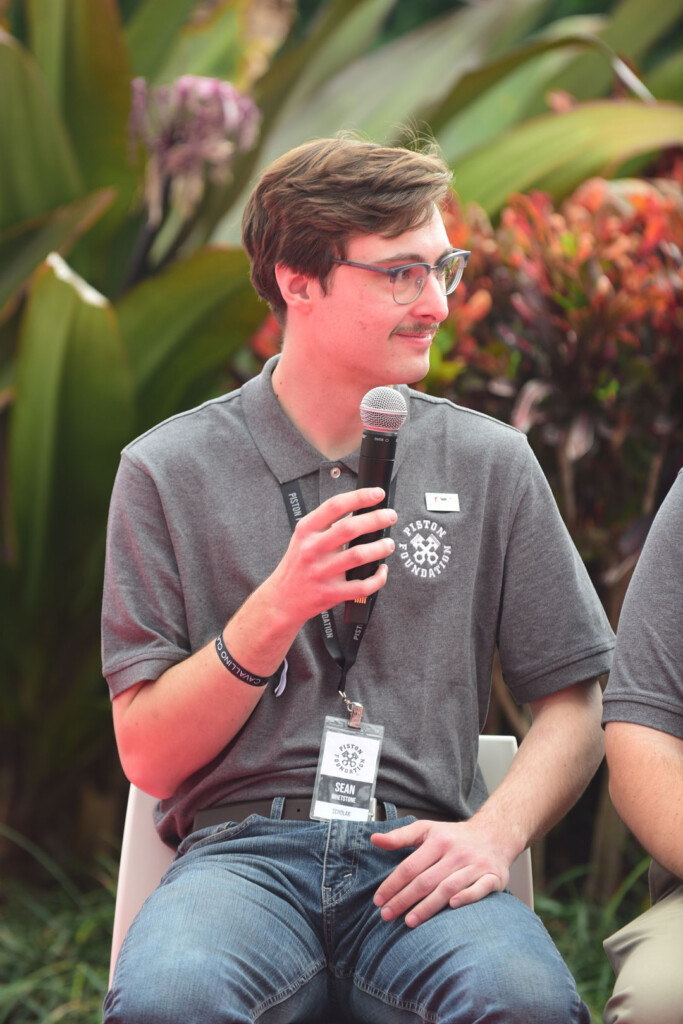
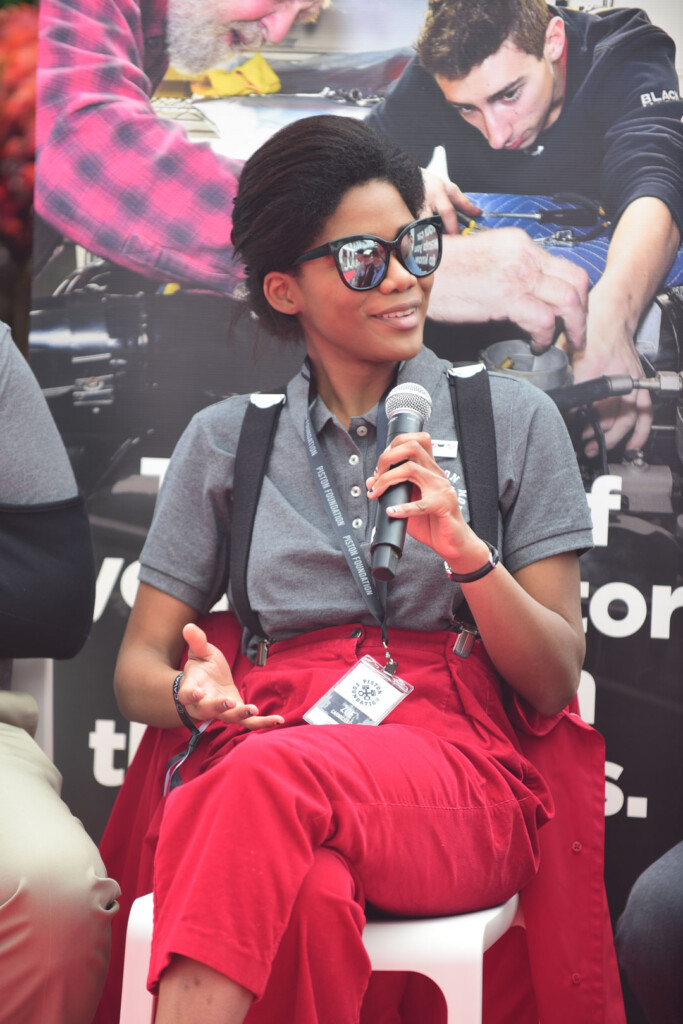
SH:
That’s fantastic. I want to get back to that, but first I want to ask Zoe, what do you think are the strengths of young people working in this collector car world today? There’s this idea that young people aren’t interested. Well, we’re scrapping that. What are some of the strengths that you see in your abilities to do this?
ZC:
I would say that young people are definitely interested in cars. They have video games, of course, to credit for that. They have Forza, Grand Theft Auto, and others. There’s a lot of time spent on Facebook marketplace where we just scroll and scroll looking at cars we’d love to buy. We’re interested in everything, truly.
SH:
Do you see an advantage with some of that technology, some of the familiarity? When Jeff and I were your age we were scouring crates of old magazines at yard sales, trying to figure out what a Vignale bodied Ferrari was. You’re just a Google search away from such things.
ZC:
Absolutely.
JM:
That’s a really interesting point about this generation. They have access to more automotive information than any of us ever had. For you and I, Sperry, it was magazines. It was Car and Driver, Road & Track, and Hot Rod Magazine. That’s where we learned about cars.
Now, the internet has made all of that information available and it’s a real strength for younger technicians to have that at their fingertips. They’ve grown up with it and they know how to use it. I think we sometimes discount the digital skills that digital natives, gen Y, and Gen A, bring to the shop floor.
SH:
With that idea of technology, Paul and or John, are you guys keeping current with the opportunities for digital scanning, rapid prototyping, any of that sort of work? Or are you maintaining the old world craftsman course?
PR:
We’re trying to understand the opportunities that new technology presents. At the same time we’re focused on the fundamentals. You can make much better use of 3D printing and things like that if you already understand what characteristics you’re looking at in an aluminum casting for an oil pump or something like that. You can’t really have one dimensional track. You need to go down both roads. In our experience with 3D printing, t’s not magic. The end result is something that needs to have the performance characteristics that you’re looking for.
SH:
Right. What about you, John? Are you employing those techniques?
JD:
We’re pretty old school. A lot of times we only need one part, so it’s much easier for us to chuck it up on a lathe or a mill, carve that piece out, get it on the car. We like to ask “how would Luigi do it?” He was forming panels against a tree stump and his hammer or casting stuff out of melted down war plane parts. And we do a lot of that.
We built our own furnace to melt plexiglass to form curved windows and we’ve built ovens to harden parts that we machine. We’ve played around with spray plasma to build up worn parts so that they can be remachined, and we’ve done some 3D printing. We’ve done some rapid prototyping and scanning, but when you hold that piece in your hand, it doesn’t have the flavor. You can’t 3D print something and put it on a 1953 Ferrari.
So I think there’s a place for it if I need 10 of something. But if I only need one or it’s got a past muster from a concours judge, then I can’t just wave a magic wand and push a button.
SH:
Sean, does that reflect the education that you guys are getting? You’re getting kind of the mix of old world craftsmanship and then some of those cutting edge technological opportunities as well?
SW:
Yeah, I think that these cars were built with old world technology and that the easiest way to rebuild them is with the same technology. We invent new things to make things in different ways, but it doesn’t necessarily mean it’s a better way.
SH:
Jake, you’re nodding your head. Do you see it the same way?
JK:
I’m more old school, too. I understand completely what he is saying about sometimes if you just need a part, it’s just a bespoke replacement part, you’re not going to invest all this money in this new technology to do it unless you need to do a production run.
SH:
Paul and John, what do you guys think are the hurdles that young people entering this industry are facing?
PR:
Part of it is one way to develop that passion is through exposure. There’s a lot of great collections around the world and in the United States. A lot of them are behind closed doors. They can come to our concours and see a car on the field. It’s in there for a very, very high level technical judging.
But that’s a rarefied atmosphere. I think one of the greatest developments has been the proliferation of cars and coffee where they just come and park cars and people can come. And if I’m there and a four year old wants to sit in the Testarossa, I say jump in. Please.
If you talk to almost every car person, man or woman, that loves cars today, there is an ignition point. Somewhere where an uncle, their father, a neighbor, had this really cool car and that got them rolling. So exposure, I think frankly, is a responsibility of today’s collectors and owners.
SH:
Zoe, let me ask you, what do you think are some of the hurdles that you face getting into this?
ZC:
Finding a good mentor I think would be the most important. That didn’t happen for me until a couple years in. I had a good friend who taught me everything that I know. He gave me a manual that I still use to this day called Keep Your Volkswagen Alive. And I’m truly grateful for his mentorship because I wouldn’t be where I am today without it.
SH:
Mentors are critical. Thinking of Paul’s comment, when you see that kid that’s beaming at your car, give them the opportunity to get inside. They’re not going to hurt it.
Jake, what do you think are some of the hurdles? I mean, you talked about the financial component. What else?
JK:
Well, we were talking about technology, these guys are a little bit younger than me, I didn’t have the internet until I was 12 or 13 years old, so I see a generation gap just between my own peers.
You can learn a lot from YouTube, and sometimes that’s all you have to learn from, but it doesn’t mean it’s the right way to do it. Sometimes you just need someone with expertise and experience to teach you how to do it. You can watch a video on how to shape metal but doing that and trying to put some craftsmanship into it on your own, it’s just really hard.
I hit a point where I just couldn’t get any further. I had to seek out an education to get to where I want to be. Everything’s on the internet, even bad information. So our school [McPherson College] seemed like the only path for what I wanted to do. I just think that mentorship and having somebody with experience to teach you goes a really long way. Without it, it’s scary navigation through this career.
SH:
We all need help. That’s a big thing that resonates with me and probably with everybody who’s sitting here today. Jeff, as you hear all of these challenges, what are the things the Piston Foundation is doing to help?
JM:
It really comes back to the three things: awareness, education, and hands-on training.
There’s awareness, which is really converting that interest into that awareness of a career path. Paul mentioned cars and coffee and that is great. We have a program called Car Show Classroom where we bring high school students who are in tech programs, could be auto, could be STEM, and we pair them up with working technicians to walk the car show together. That gets to that ignition spark that Paul talked about.
We’re using that program to try to provide that spark because most kids don’t know someone in the trades, most of their parents don’t know someone in the trade. So if a kid has an interest in being somebody that works with cars, they need a role model to look at.
Car show classroom is about connecting kids with techs who could be a mentor, like Zoe described. It actually gives them a role model. They say, “There’s a guy who’s 25 working on Porsches all the time. That’s who I want to do”. It’s a simple connection that provides that ignition point and makes the vision of the career possible. So I think we’re doing well in understanding what’s needed to reduce the friction for young people and give them the assistance they need.
SH:
It’s not just scholarships, which we’re all familiar with and we can appreciate the work that does, but the continuing efforts. I think that’s key.
JM:
As we close it out, I just want to boil all this down to something that everybody can do, Sponsor a Piston Scholar.
The simple math of what the Piston Foundation is doing is this: $5,000 supports a scholarship and $15,000 supports an apprenticeship. If we as a car community want to see this happen, if we want to see these skills sustained, if we want to create career paths for young people with the interest and we want to help them get there, the thing that everybody can do is sponsor a scholar. From a small gift to a large one, everybody can get involved.
As a public charity it’s the car community that supports us, and it’s the car community that we look to support these endeavors. If you have the capacity to sponsor a Piston Scholar, the very simple math, it’s $5,000 per student per year. That’s what it takes. And if you’re interested in really providing a career path that gets to hands-on-training, $15,000 supports an apprenticeship. 100% of each donation goes into our scholarship funds to help change lives and create careers for young people. So very simple, just sponsor a Piston Scholar.
SH:
It’s meaningful support. So let’s do it.
I’d like to thank John Dega and Paul Russell for joining us. Thanks to the Cavallino Classic for supporting us and hosting our students. A huge thanks to Zoe Carmichael, Jake Koehn, and Sean Whetstone for being on our panel. And thanks to our car community audience.
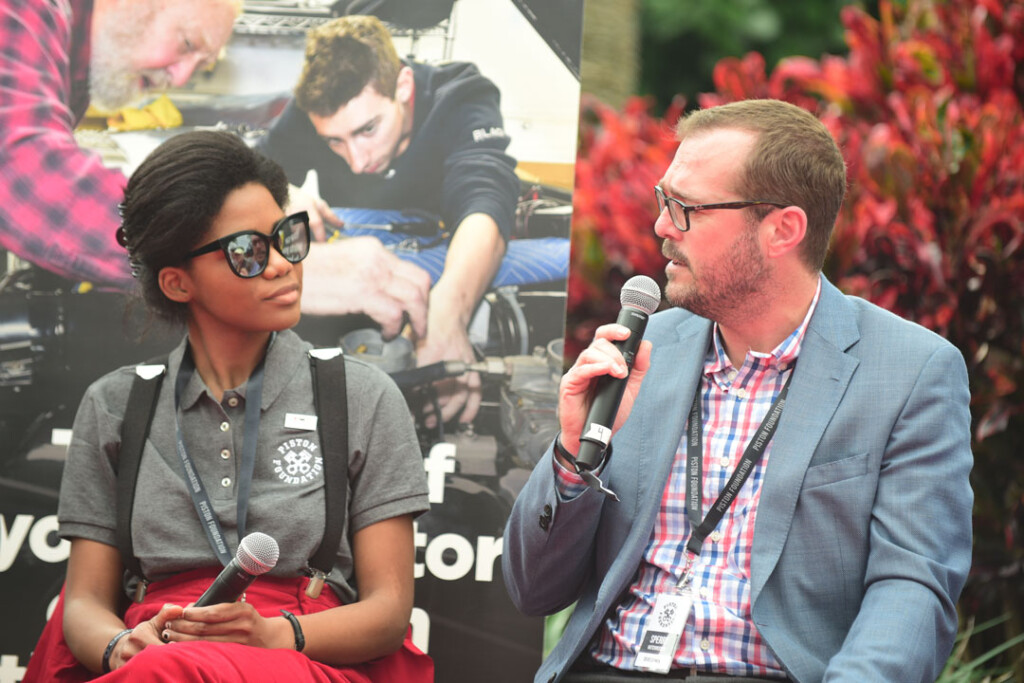
Donate
Today
Support skilled trade education for future auto restoration technicians.
Campaigns
Give to What You Love
Make a gift that helps the next generation access the education and training they need to begin a career as a classic car technician. Gifts of any size are appreciated and will be used to fund our scholarship and apprenticeship programs.
Sponsor a Piston Scholar
Piston Foundation scholarships are awarded to aspiring technicians to help them begin an auto restoration career. Give to the car culture you love. 100% goes to fund scholarships.
Cars for Piston Scholars
Turn your collector car into education and hands-on training for aspiring collector car technicians. Your car can change lives. 100% goes to fund scholarships.
Give to What You Love
Make a gift that helps the next generation access the education and training they need to begin a career as a classic car technician. Gifts of any size are appreciated and will be used to fund our scholarship and apprenticeship programs.
Sponsor a Piston Scholar
Piston Foundation scholarships are awarded to aspiring technicians to help them begin an auto restoration career. Give to the car culture you love. 100% goes to fund scholarships.
Cars for Piston Scholars
Turn your collector car into education and hands-on training for aspiring collector car technicians. Your car can change lives. 100% goes to fund scholarships.
Subscribe
Sign up for our monthly email with stories, updates, and volunteer opportunities.

